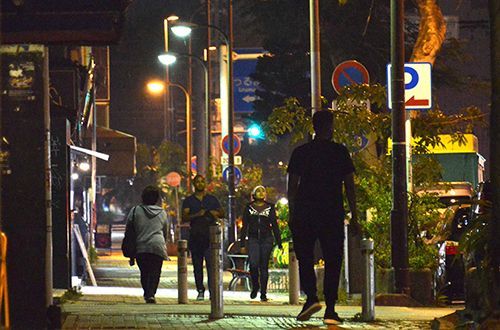Restrictions on off-duty US servicemen greatly loosened, causing Okinawans concern and fear

Gate Street in Okinawa City, photographed at about 8:00 p.m. on April 3. On weekdays Gate Street is sparsely populated, yet on the weekends it is bustling with U.S. soldiers.
April 4, 2019 Ryukyu Shimpo
On February 26, the USFJ Okinawa Area Coordinator Lt. Gen. Eric Smith greatly loosened the restrictions of the Liberty Policy, which regulates the activities of U.S. troops when they are off-duty. Local residents of municipalities in the central part of Okinawa Island, where many U.S. servicemen and civilians employed by the military live, say they “cannot understand” the decision and are cautioning that there will be more incidents and accidents.
People who expect activity in the area to increase are warning that U.S. servicemen are expected to observe the law. However, Marines stationed in Okinawa and persons involved with the bases are welcoming the change.
There is a marked difference between how the U.S. troops and local citizens feel about this development.
In the afternoon on April 3 Sato Gushikata, 28, a housewife living in Chatan Town, visited the town’s American Village which is popular with U.S. servicemen and local citizens alike.
She expressed empathy with U.S. soldiers, saying, “The U.S. servicemen are like us; outside of business hours they must want to be free to enjoy themselves.
” Yet in regard to when military base personnel are seen at night, drinking at restaurants in the area and talking loudly, she said that, “With or without regulations, that is an issue of morality.
” She brought up that, “While there is clamoring about removing the military bases, more than that I want [military base personnel] to never do things that will anger or frighten Okinawan citizens.”
Lodging restrictions placed on the area south of Camp Kinser in Urasoe City in 2016 have been lifted, and there, too, people are voicing concerns about this alleviation.
The restrictions were put in place after incidents including one in March 2016 in which a woman, a tourist from mainland Japan, was raped by a U.S. serviceman who was staying at a Naha City hotel after a night of drinking. Sachiko Matayoshi, 70, a resident of Naha City, said, “The fundamental problem is that U.S. bases are concentrated on Okinawa.
If, as they say, Okinawa is a part of Japan, the whole country should bear the burden fairly.”
There is an English radio commerical on the American Forces Network (AFN) that is broadcast many times per day and is targeted toward military personnel in Okinawa.
It tells its listeners not to drive if they have consumed even one drop of an alcoholic beverage, and strives to make it common knowledge that Japan’s drinking and driving regulations are much stricter than those in the United States.
It also encourages base personnel, as one option, to use proxy driving services available in Okinawa. It appears that the U.S. military, too, considers soldiers’ drunk driving a serious matter.
On the weekend US soldiers stand out on Okinawa City’s Gate Street.
On April 3 the base personnel were sparse on Gate Street, and patrol vehicles with blue lights drove about.
One 71-year-old independent business man who travels along Gate Street every morning and evening spoke about the alleviation of the Liberty Policy.
He said, “I cannot accept it. If there are more incidents and accidents, I think the policy will just be made strict again.
The fundamental rules should be made strict before someone is hurt, and the Status of Forces Agreement and such things should be changed.”
(English translation by T&CT and Erin Jones)
Previous Article:“Even now colonialism continues.” Researcher calls for the restoration of self-determination for Okinawa 140 years after the Disposition of Ryukyu
Next Article:Citizens stage sit-in and canoe protests as K8 seawall construction continues in Henoko
[Similar Articles]
- Soldiers pour into main streets after period of mourning for US forces on Okinawa
- Easing of restrictions on US soldiers’ drinking worries residents
- Okinawa City Council passes protest resolution over hit-and-run
- US military police officer arrested on suspicion of driving under the influence
- Editorial: Reality of “period of unity and mourning” is drunk US Navy sailor driving against traffic on national highway
 Webcam(Kokusai Street)
Webcam(Kokusai Street)


